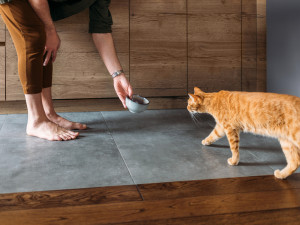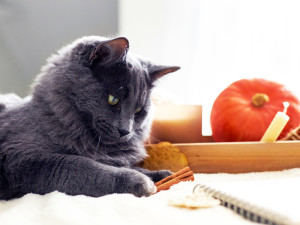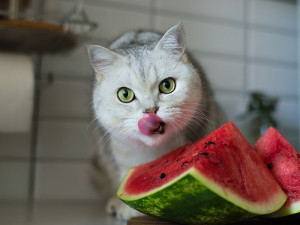Can Cats Eat Spicy Food? Find Out If Spicy Foods Are Healthy or Not
We detail the latest research.

Share Article
In This Article:
Can Cats Safely Consume Spicy Foods?opens in a new tab Signs Your Cat Has Eaten Spicy Foodopens in a new tab Why Are Cats Even Interested In Spicy Food?opens in a new tab Healthy Alternatives to Spicy Food For Catsopens in a new tab Can Cats Taste When Something Is Spicyopens in a new tab
Some of us crave the spicy heat that makes our eyes water, and some of us take a wide berth away from any fiery foods. Whichever category you fall into, you may wonder whether your cat would enjoy the heat associated with eating spicy food.
The truth is cats don’t experience spicy food the same way we do, often making it a more negative experience. Spicy foods can also be very irritating to your cat, so it’s not something you’ll want to feed them. Here’s why.

littleKin™ is Kinship’s home just for puppy and kitten parents. Bop over to check out expert advice, new pet tools, and special deals—all curated for your newest family member.
opens in a new tabCan cats safely consume spicy foods?
Cats aren’t likely to seek out spicy foods the way that some humans do, but they may eat it out of curiosity or if it’s part of another dish that they’re interested in. However, even a little bit of spiciness can cause irritation in some cats, leading to vomitingopens in a new tab, diarrhea, and stomach pain. Other cats may have a higher tolerance, but it’s best to avoid feeding spicy food to cats altogether.
What is in spicy foods?
The spice or heat that we usually associate with spicy foods is most often due to capsaicin, the compound that makes peppers spicy and helps keep animals from eating them. The more capsaicin, the more heat.
But capsaicin isn’t the only flavor when it comes to spicy foods. They can also have a bit of a bitter taste, something your cat likes to avoid, and they can contain toxic ingredients, such as onions or garlicopens in a new tab.
How spicy food impacts cats
Our mouths have receptors for capsaicin that are responsible for the heat, taste, and even the little bit of pain that we feel when we eat peppers and other spicy foods. While cats also have these receptors, they may not respond to them in quite the same way. In fact, a cat’s palate is fairly unrefined, containing less than 500 tastebuds, as compared to our 9,000.
With fewer taste buds, cats likely experience heat and pain from eating capsaicin but might not get the full flavor effect as we do. The immediate inflammation and pain triggered by capsaicin can also lead to irritation of the digestive tract.
Potential risks and negative health impacts
When you’re dealing with digestive irritation, you’re looking at vomiting, diarrhea, abdominal pain, and likely a decreased appetite. Cats may also drool or paw at their mouth or have difficulty swallowing.
Capsaicin aside, spicy foods containing onions opens in a new taband garlic can be even more of an issue as these ingredients can be toxic to cats, cause digestive issues, and, if they eat enough, cause damage to red blood cells.
Signs your cat has eaten spicy food
If your cat eats spicy food, they may experience symptoms such as drooling, vomiting, diarrhea or not eating. These signs usually last a day or two and then your kitty will be back to normal.
What to do if your cat eats spicy food
Fortunately, most spicy food encounters in our cats aren’t more than just a taste. However, sometimes the aforementioned symptoms can last longer than a few days or become severe. In these cases, contact your veterinarian as medical intervention may be necessary.
Why are cats even interested in spicy food?
For most cats, the smell of spicy food alone will be enough to turn up their nose; Most cats will be indifferent or will avoid spicy foods. However, there are always a few critters who let curiosity overcome them and sneak a taste — likely because it’s something you are eating and they just can’t help themselves. For those cats, thankfully, most won’t eat more than just a bite once the heat kicks in.
Healthy alternatives to spicy food for cats
Cats really don’t need anything other than good quality cat food, but we’re only human and when they come at us with those begging eyes, it can be hard to resist. Rather than sharing your jerk chicken or curry with your cat, reach for healthier optionsopens in a new tab, such as:
Lean, cooked meats
Cooked fish
Remember, these foods should be considered treats and only fed in moderation. Thoroughly wash and remove any skins, peels, or seeds. Serve plain, without any seasonings or additions.
Can cats taste when something is spicy?
A cat’s sense of taste is fairly basic, so when they eat spicy food, they don’t get the full extent of the experience. Instead, they feel the heat and pain without really experiencing the taste. Because of this, most cats actively avoid spicy food.
References
“Do Cats Have Tastebuds?” AnimalPath.org.https://animalpath.org/do-cats-have-taste-buds/opens in a new tab.
“The Health Risks of Eating Extremely Spicy Foods.” Cleveland Clinic Health Essentials. 13 Mar 2023.https://health.clevelandclinic.org/health-risks-of-spicy-foodopens in a new tab.
“Umami taste perception and preferences of the domestic cat (Felis catus), an obligate carnivore.” Chemical Senses. 8 Aug 2023.https://pmc.ncbi.nlm.nih.gov/articles/PMC10468298/opens in a new tab.

Dr. Chyrle Bonk, DVM
Dr. Chyrle Bonk has been a mixed animal veterinarian since 2010. When she's not practicing or writing about veterinary medicine, you may find her exploring the outdoors with her family or tending to her cows, horses, chickens, or cats and dogs.
Related articles
- opens in a new tab
Can Cats Eat Sweet Potatoes?
Yep—but the plainer, the better. Here’s why.
![White kitten with tongue out next to slices of watermelon]() opens in a new tab
opens in a new tabCan Cats Eat Watermelon and Watermelon Rind?
Yes, watermelon is a nutritious treat for cats.
- opens in a new tab
Can Cats Eat Oranges?
The question should be: Do they want to?
- opens in a new tab
Can Cats Eat Peas?
And what you should consider in their everyday diet.
- opens in a new tab
Can Cats Eat Peanuts?
They’re not technically dangerous, but they’re not ideal.
- opens in a new tab
Can Cats Eat Eggs?
Breakfast, anyone?







